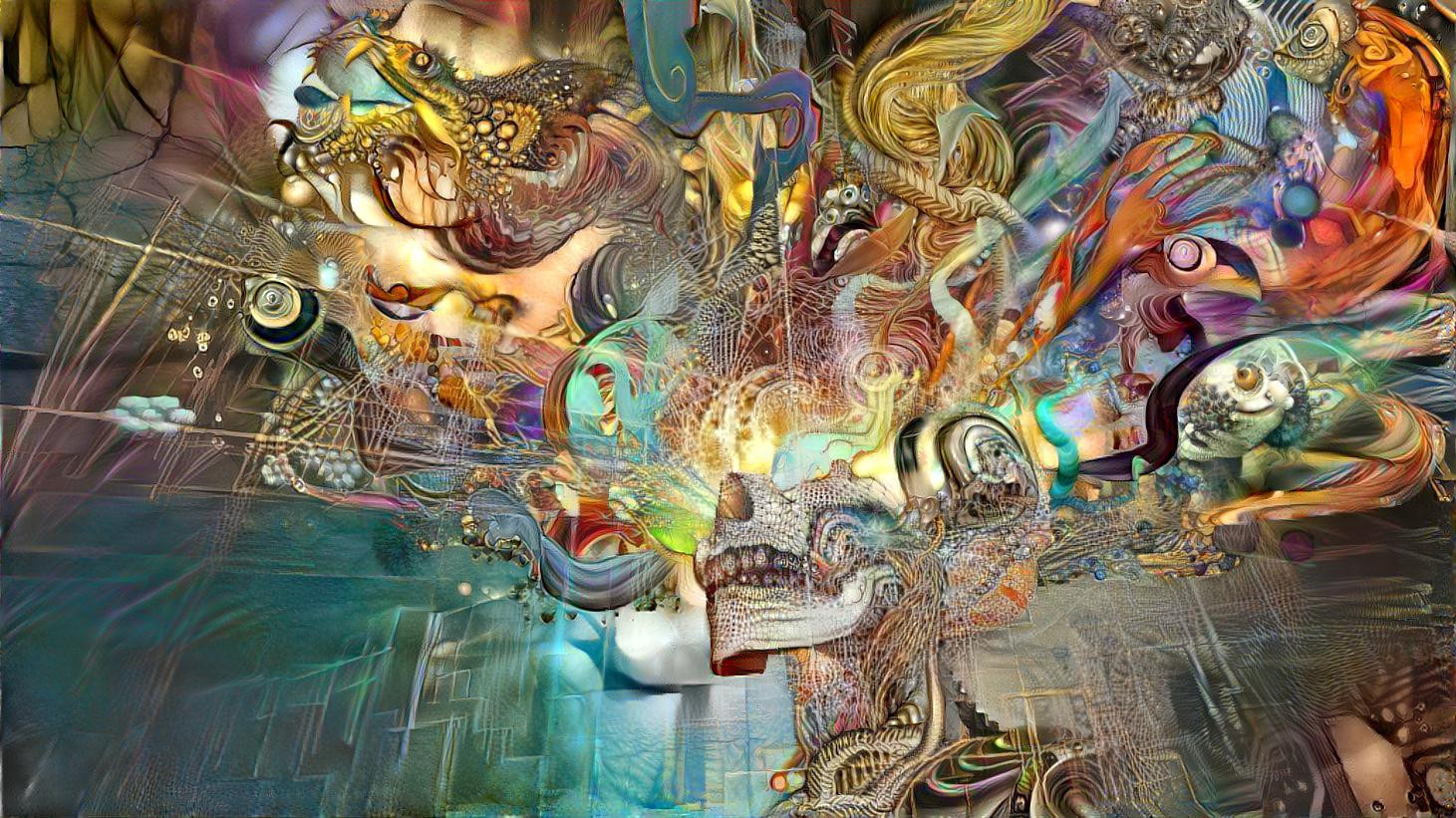The urge to fix is fear; we are hanging onto the pattern we know and are familiar with, the pattern we are too afraid to let go of.
We don’t know that this is what we are actually doing when we being driven by the urge to fix – we don’t look into it that much. Actually, we don’t look into it at all. ‘Fixing’ (or ‘trying to fix’) and ‘looking into what we are actually doing’ are two totally different things – the former excludes the latter!
We don’t know that we are ‘hanging onto a pattern that we know and are familiar with’ – we don’t have this awareness. All we know is that ‘something needs fixing’ (or that ‘something needs protecting’) and this is a purely mechanical type of thing. It’s an automatic reflex, in other words, and the whole thing about automatic reflexes is that we just go along with them. It’s not even that we ‘assume that the automatic reflex is right’ because we don’t give it as much thought as this. We just go along with it, and that is that.
The truth of the matter is that we almost inevitably are ‘hanging onto the old and familiar’ of course – with else would we be doing? There are only two things in the whole wide universe – one of them is ‘hanging onto the old and the familiar’ what the other is ‘taking an active interest in what’s going on’ and so if you’re not doing one then you must be doing the other! Of these two things the former happens all by itself so that all we have to do is go along with it (without even knowing that we are going along with it) whilst the latter only ever happens against the grain, in complete ‘defiance’ (so to speak) of the mechanical forces that are ruling the roost.
The mechanical forces that rule the roost never want us to ‘look into what we are actually doing’ – this is most definitely something they never ever want us to do! Mechanical forces never give rise to consciousness – the mechanical forces that run our world and operate society claim to potentially give rise to all sorts of wonderful things and this is what validates it in our eyes. The one thing they never do (and never will) is to give rise to consciousness, however! This one, very simple truth shows society and all of our socialised behaviour up for exactly what it is.
Society makes many claims for itself but none of them involve consciousness, and if none of them involve consciousness then this makes a big joke of the whole thing! Society makes innumerable explicit claims for itself, and one very big implicit claim, the ‘implicit claim’ being that everything worthwhile is to be achieved through its agency. In this it is somewhat like the mediaeval Church in Europe, who had the monopoly on salvation. Everything worthwhile is to be achieved via society’s agency, and yet at the same time one thing that can never be ‘achieved’ as a result of going along with the mechanical forces that make up society is consciousness, or ‘actually being aware of the truth of what’s going on’. Somehow that detail just never seems very important to us; somehow we just never seem to think about the truth very much. We’re far too busy with the never-ending goals that society gives us to concern ourselves with to take an interest in consciousness.
Society – like all equilibrium systems – is all about ‘fixing’. It’s all about fixing and nothing else; all is subsumed within the great cause of ‘fixing’ (or ‘returning everything to the equilibrium value’) and so nothing else really exists. Only the goal exists. Only the ‘equilibrium’ exists and by ‘equilibrium’ we mean ‘hanging onto the pattern that we know and are familiar with’. Part of doing this is to say that the pattern we are seeking to preserve is very special indeed, very important indeed, and so it must never – on this account – be tampered with or interfered with in any way. Our endless ‘fixing’ is nothing more than the constant effort to rectify all deviations from the equilibrium value and return us to where we should be. This is the essence of the conservative impulse – the impulse to uphold and venerate the established way of doing things, for no other reason than the fact that it is the established way of doing things.
Another way which this equilibrium-seeking motivation may manifest itself is in terms of what we might call ‘progressivism’. This might sound somewhat contradictory but it isn’t. One way we are looking for ‘the ideal’ in the past, and in ‘traditional values’, and in the other way, in the progressive way, we are looking for ‘the ideal’ in the future. Looking for the ideal in the future instead of the past sounds like a different sort of a proposition, but it isn’t at all. It isn’t a different sort of thing because no matter where we look for the ideal, we are still looking for ‘the ideal’, which is to say, we are still trying to reach some sort of imaginary or abstract ‘equilibrium value’.
Equilibrium values are always imaginary – they are ‘precise, unvarying abstractions’ (i.e. they are ‘points on a graph) and as such they are of course abstractions. They have no more reality than ‘an average’ does, or a table of weights and measures does. We don’t see equilibrium values as ‘unreal abstractions’, needless to say; we see them as ‘supremely important goals’ that we have to aim at and so although E-values don’t have any objective reality, they have a tremendously significant subjective reality for us. They have a tremendously significant subjective reality for us because we are always aiming at them, because our success or otherwise at approximating them (which we call ‘winning’) determines how we feel about ourselves.
Inasmuch as our lives are determined by our thinking, regulated by thinking, organized by our thinking, we are always going to be working in service to these unreal equilibrium values. How could it be otherwise? Our existence revolves around them – as we have just said – whether we feel good or bad, whether we feel worthwhile and ourselves are useless, depends on whether we are how well we are doing when it comes to hitting the ‘target’ which is the mind-produced equilibrium values. So if this isn’t being ‘enslaved by illusion’, or ‘enslaved by the unreal’, then what is? We think that we are ‘hard-headed’ and ‘soberly grounded in reality’ because we are so very rational-minded, but precisely the reverse is true! To be governed by our thinking is to be governed by abstract values and to be governed by abstract values is to be governed by the unreal.
The ‘pattern we know and are familiar with’ is unreal. Of course it’s unreal – it only exists (it is only ‘a thing’) because we have repeated it so many times, and as a consequence made ourselves deeply familiar with it. That doesn’t make it real though! Whatever pattern we repeat many times will become real and so – for us – ‘real’ just means that whatever story it is that we are familiar with! We invent E-values out of thin air in other words, but the fact that we do so can’t really be used as an argument to say that they are real! It is – rather – unequivocal evidence to the contrary. No matter how imaginary the equilibrium values might be however, they give rise to immense mechanical forces, forces that determine the ‘overt’ pattern of our lives. Every time we chase goals (or get caught up in trying to ‘fix errors’) we are repeating and solidifying this pattern. Whether we trying to retain the values of the past or attain some ideal state in the future makes no difference – either way we are reaching out for the unreal; we ‘reaching out for the unreal’ because all our ideals are unreal, as we have just said. This is a very curious thing, when we see it clearly – it’s a very curious thing because it’s a complete inversion of what we think is happening. When I am striving towards a goal I perceive it to be the case that I’m trying to progress from a situation that is deficient in some way to a situation in which this deficiency has been made good, but what is actually happening is that I am ‘straining to attain unreal state’. There’s no question of ‘making good a deficiency’! When I’m trying to ‘fix’ the present situation the same thing is true – I am identifying the present reality as ‘an error‘ and am trying to replace it with my ‘idea of how things should be’, which is of course unreal.
When we manage to ‘attain the goal’ (or ‘fix the problem’) then we feel the full flush of the euphoria that comes with this, and this euphoria is what we’re really trying to obtain. We might say that we want to win at the game, or that we want to succeed at the task, or realize the goal, but what we really want is the pleasure–reward of euphoria, which essentially comes down to ‘thinking we have solved something when we haven’t’. This is pseudo-solution pure and simple. We have simplified down reality to one token ‘problem’ that can be fixed in a straightforward way (in a straightforward way that the original difficulty can’t be solved) and we have obtained the sense of relief that comes with ‘believing our own ridiculous lie’. Euphoria is the ‘sense of relief’ that attends ‘successful denial’, in other words.
What are actually doing here (although we never ever see it, and we certainly wouldn’t want to admit it anyway even if we did see it) is that we are ‘running away from life’ (or ‘running away from reality’). We are heading in the opposite direction, as fast as we possibly can, whilst at the same time validating what we doing as some kind of ‘positive achievement’, as some kind of ‘progressive step forward’. To put this very simply, we call successfully running away from reality ‘winning’ and we see it as ‘an unquestionably good thing in its own right’; we then we use this basic inversion of the truth as the basis for everything. We orientate our lives in this direction and never (or very rarely) have any uncomfortable feeling that we are ‘seeing everything backwards’. For us, making the world more certain, more concrete, is the achievement. Making ourselves more certain and more concrete is the achievement – this is what ‘winning’ or ‘attaining our goals’ is – we making things certain, we are bringing everything into line with the narrowly defined equilibrium values. Narrowing everything down to only one configuration out of many others, narrowing everything down to only ‘one possibility out of the Total Set of All Possibilities equals ‘attaining the goal’ and this is cause for celebration. Congratulations are in order…
The thinking mind can never do anything other than ‘making the situation more certain’, or ‘making the situation more concrete’. This is information-loss therefore and as such it is a one-way street, it is ‘the arrow of irreversibility’ – an arrow that cannot turn around and fly back the other way. The activity of the thinking mind is an arrow that ‘can’t not get to where it’s going’ and as long as we identify with this thinking mind, and invest everything that we’ve got into the activity it dictates, we are going to be sharing the same fate. We’re heading to that place too – we’re also heading full-speed ahead to ‘the world that is made up of abstractions’, even though it isn’t a ‘place’ or ‘world’ at all. It’s ‘a place that is no place’, it’s ‘a world that is no world’. The world of abstract representations has no reality to it at all, and yet nothing could sound stranger to people than to say this. No statement could invite greater incredulity. The world that is created by our conceptual mind is the only world we know – it’s the fact that the conceptual-evaluative mind can define something and name it and measure it that proves to us that this ‘something’ is real. And yet at the same time, the very fact that what we are relating to has been named, has been defined, has been measured, shows us with perfect clarity that it has no actual reality to it at all.
The question is, what else can we do apart from engaging in the activities that are dictated by the rational-purposeful mind? If we aren’t supporting (or defending, or promoting, or fixing) some pattern or other then what would we be doing? What else is there? It is perfectly natural that we would have such great difficulty in understanding how there could be any other ‘orientation’ than the orientation towards equilibrium values – it is no small matter to flip our orientation around by 180 degrees. It’s easy enough to aim at defined values since there’s something definite there to aim at; but how do we take an interest in openness, in what we don’t know and can’t see (and don’t believe in anyway)? Fighting or pushing against the established pattern is no good because this just creates a mirror-image pattern, a counter-pattern. Logically trying to work this out is no good however because we just keep tying ourselves up in knots with our efforts – the problem is only in our way of looking at things, nowhere else. Since the equilibrium values to which we are orientating ourselves are not real our attempts to extricate ourselves from their influence is not going to be real either; what is ‘real’ (or non-abstract) is the way things are before we try to fix them, before we make the compulsive attempt to reach for the concrete and the certain.
When we strain to become more definite, more certain (or to bring about definite outcomes that are specifically relevant to us, which is the same thing) we become unreal. We narrow ourselves down to the point of being abstractions ourselves. Curiously, therefore, we start off by being present, and by straining after outcomes we become absent. The ‘urge to fix’ is the urge to deny our true nature out of fear, and in everything we deliberately or purposefully do we deny our true nature. Mechanical activity is the denial of consciousness. The more we control the less present we become – becoming ‘less present’ (up to the point of becoming entirely absent) is the fruit of our controlling, the fruit of our ‘fixing’. We’re afraid of being present and so we’re running away; we’re constantly fleeing from reality and we’ve turned this ignominious fleeing into a virtue – what else would ‘unconscious living’ be about, anyway?
Image: Taken from Zastavki.com






